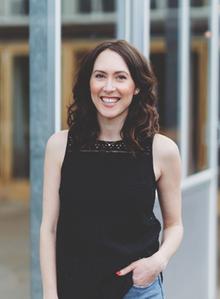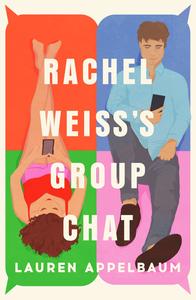
|
|
| Lauren Appelbaum (photo: Kiersten Marie) |
|
In Rachel Weiss's Group Chat (Forever, $17.99; reviewed in this issue), Lauren Appelbaum explores the delights and travails of being an American millennial. When Rachel Weiss's circle of friends find significant others and meaningful careers, she is forced to consider her own lifestyle and what she truly wants. Appelbaum lives in Seattle with her family.
The Pride and Prejudice/Bridget Jones's Diary connections in your book are done so well. Did you begin planning Rachel's story knowing that you wanted to give a nod to those classic novels?
The first spark of an idea I had for this book was, "What if it was an homage to Bridget Jones's Diary, but with a group chat instead of a diary?" Then the characters and plot points came to me from there. So it was definitely intentional, and I had a blast with it, because I've always been a big fan of both.
Pride and Prejudice was the original enemies-to-lovers story, right? I just love how Elizabeth and Mr. Darcy's relationship forces them to reckon with parts of themselves that might need some work. I tried to capture that dynamic with Rachel and Christopher. And I always loved the character of Bridget Jones, because it was such fun to watch her try her best and yet make so many mistakes. The other thing I've always loved about that story is the friend group, the way they are always there to rehash everything that is going on in each other's lives. My mom once told me that friends can come and go, but your spouse is with you forever--but when you're young and single it's very much the opposite. Your friends are there through every relationship and breakup. With Rachel Weiss, I wanted to explore the awkwardness that happens within a friend group when that starts to shift.
The Seattle insider references are great fun. Do you think the story could have been set elsewhere, New York or Los Angeles, for example, without impacting the story?
I love this question! Rachel's worldview, sense of self, and social circle are all shaped by the culture she lives in, which is Seattle. Anyone who lives around here can tell you we're a bit weird and quirky. I've heard other cities have started doing naked bike rides, but one of my favorite scenes in the book is set on the river in the Bavarian town of Leavenworth, which I don't think you could quite replicate anywhere else in the country. The river float scene was inspired by true events that happened during my bachelorette party. The absurd hilarity of a group of possibly drunken women trying to rescue one another from the river's current is burned into my memory. Regarding the naked bike ride, I have never participated, being more inclined to watch from the sidelines, but one of my sisters has! I would love to be that bold. The main reason it had to be Seattle is that it's the place I know best, having lived in the area since I was a tween, so I might not have done another city justice in the same way.
 Rachel's evolvement from carefree single person to a more thoughtful, emotionally mature woman who contemplates her place in the wider world seems on point for contemporary 20-somethings. Did you base her journey on observation of friends or your own experiences?
Rachel's evolvement from carefree single person to a more thoughtful, emotionally mature woman who contemplates her place in the wider world seems on point for contemporary 20-somethings. Did you base her journey on observation of friends or your own experiences?
It's human nature to be entirely focused on yourself when you're younger, and everyone has to evolve past that in their own way, which is harder for some people than others. Rachel is sort of my exact opposite (I'm a classic introvert), but her flaws might (might!) be amplifications of my own flaws. It feels to me like it's not unusual for millennials and younger generations to be more self-centered, because we are often told to tune into our feelings (not to mention that we often have to self-advocate in so many ways), and that's not always a bad thing.
But Rachel learns, like we all have to at some point, that the world doesn't revolve around her, and that her actions and words impact other people. Learning these lessons at the ripe age of 30, Rachel is in a kind of arrested development, but that's pretty typical in my experience. A lot of us don't even think about settling down in the traditional sense until our 30s. There's an interesting divide between those who have settled down and those who are still dating or single. It may cause rifts or changes in friendships, but it's always fun to hear the stories from the other side. So I wanted to write about that time in a person's life, when things start changing around Rachel but she's not sure if she's ready to change yet.
Rachel's relationships with her chat group friends, her sister Jane, her mother, and younger sisters are an important part of her life, and the theme of "sisterhood" and what that means in a woman's life runs through the plot. Did you intentionally create that theme or did it evolve as the plot unfolded for you?
The theme of sisterhood unfolded naturally and inevitably. Rachel's friends are incredibly important to her, and she grew up in a family full of women. Having other women around is so important at every life stage--people to make sense of the world with. At various points, Rachel looks up to her older sister, wants to differentiate herself from her mother, learns from her friends, and gains a new sense of who she is based on how they all see her. I've always felt that we have a kind of primal need for Girl Talk, so it makes sense that Rachel's group chat is like a lifeline to her.
Your bio says you're a tech editor. Did being an editor, although in a field separate from fiction writing, help while writing a novel?
Definitely! My editing background helps me ask, why is this here? What is the reader gaining from this part? Actually, when I first submitted the book to my editor, it was about 10,000 words too short. So I had to put my writer's hat back on and fill it out a bit more. I got to add more scenes with certain friends and with the love interest, Christopher, so that was really fun, getting to dive back in and write new stuff.
Can you tell us a bit about your writing process?
I have one superstition that I think a lot of writers probably share, which is that I won't talk about a book idea until it's pretty solidified. It feels like Ideas with a capital I are flighty creatures that get scared away easily, so I try to keep my mouth shut. Other than that, I follow a pretty basic trajectory that involves outlining on index cards, then drafting linearly in Scrivener, preferably while sitting in a café and listening to moody music. --Lois Faye Dyer, writer and reviewer

